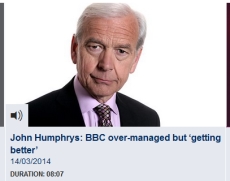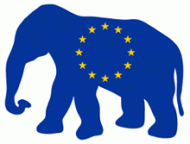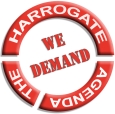 One of the most controversial aspects of the Freedom of Information Act 2000 is the way it is interpreted and applied by the BBC.
One of the most controversial aspects of the Freedom of Information Act 2000 is the way it is interpreted and applied by the BBC.
The BBC’s interpretation, backed by establishment cover among the political class, enables the corporation to reject requests for information, effectively exempting itself from being held to account by the public that is compelled by law to fund it if they own and use a device capable of real-time reception of a TV signal.
A recent story about left wing bias at BBC News and Current Affairs, as acknowledged by presenter BBC Radio 4 Today programme John Humphrys, and now a leaked briefing note from the Question Time programme showing David Dimbleby was told to direct a series of difficult questions to Lord Heseltine (Conservative) and Simon Hughes (Lib Dem), but only ask two tame and generic questions of Rachel Reeves (Labour), are the latest in a string of revelations which consistently point to BBC bias in one direction.
We could submit FOI requests to the BBC for information about the editorial line that had been taken and why it was taken, but we would receive a reply along the lines of:
…the information you have requested is excluded from the Act because it is held for the purposes of ‘journalism, art or literature.’ Part VI of Schedule 1 to FOIA provides that information held by the BBC and the other public service broadcasters is only covered by the Act if it is held for ‘purposes other than those of journalism, art or literature” 1. The BBC is not required by the Act to supply information held for the purposes of creating the BBC’s output or information that supports and is closely associated with these creative activities…
Therefore it is time for a concerted effort to have the FOI Act 2000 amended to remove the clause that allows the BBC to reject requests for information in respect of information held for purposes other than those of journalism, art or literature.
Ireland’s public service broadcaster, RTE, falls under that country’s Freedom of Information in the same way as the BBC here in the UK. However, unlike the BBC, RTE doesn’t leave its exemption open to the widest possible interpretation to suit its own interests and instead it publishes exactly what is exempt and what isn’t. RTÉ tells the Irish public that it:
… is funded in part by public money through the licence fee and we believe that our policies and operations should be open to public scrutiny and that access to our records by the public will show that we carry out our public service remit scrupulously and honestly.
before going to to explain:
What is excluded?
Commercially sensitive, personal or confidential journalistic records cannot be released. Reporter’s notes or off-the-record quotes, whether broadcast or not, are excluded. RTÉ’s internal reviews or analysis of broadcast programmes are also excluded.
It is a stark contrast to the BBC’s efforts to keep the public in the dark about how it works when suspicions are raised, questions are asked and when information requested is rejected on the basis of the catch-all exemption.
There is simply no justification for not answering questions from the public about:
- details of its editorial position on important issues
- details of its editorial decision making process when making programmes
- the names of people who inform BBC policies
- how and why it selects those people
- how it selects or omits contributors and guests on its programmes
- metrics about complaints from the public on specific issues
Releasing information about the details above would in no way compromise confidential sources or require details of whistleblowers to be revealed, which are reasonable exemptions and surely the purpose behind the exemption in the first place. It would not mean sharing commercially sensitive information and it would not require journalists’ confidential notes or off the record quotes to be shared.
Instead compelling the BBC to release information from the bullet list above would enable the public to discover if there has been bias in the way influential programmes – news and current affairs programmes in the main – have been made and if the editorial process has sought to advance a political or activist narrative, in contravention of the BBC Charter requirements on impartiality.
The only way this will happen is if the FOI Act 2000 is amended so that the exemption is removed from the BBC, Channel 4 and S4C in Wales, and a clearly defined and much more narrow exemption put in its place. The government talks at length about openness, transparency and accountability, so let the demonstrate it by agreeing to a demand from taxpayers to make those fine words a reality.
————
Some notes…
The Freedom of Information Act 2000 gives people a general right of access to information held by public authorities. As the Act makes clear:
Any person making a request for information to a public authority is entitled
(a) to be informed in writing by the public authority whether it holds information of the description specified in the request, and
(b) if that is the case, to have that information communicated to him.
But lurking deep inside the Act, on page 53, is an undefined, catch all exclusion that was granted to a public body which, more than almost any other public body, has the capacity to influence public knowledge and thinking on any number of issues – the BBC. The full reference reads simply:
The British Broadcasting Corporation, in respect of information held for purposes other than those of journalism, art or literature
That single reference is found in Part VI of Schedule 1 – Public authorities in the Freedom of Information Act 2000, which names the BBC as one of the ‘Other public bodies and offices: general’ under the provisions of the Act.
What the BBC thinks the exemptions means for itself…
In summary, the BBC considers the derogation protects the journalistic, artistic and literary integrity of the BBC by securing a creative and journalistic space for programme-makers to produce material for broadcast free from interference by those who would seek to influence our output. Additionally, as also recognised by the Court of Appeal, it allows for a “level playing field” between the Public Service Broadcasters caught by the Act (BBC, Channel 4, S4C, GMS) and their commercial competitors. In practical terms, the BBC has interpreted this to mean that we are not required to supply information held for the purposes of creating the BBC’s output or information that supports and is closely associated with these creative activities.


 This blog has not spent enough time focusing on the Labour party.
This blog has not spent enough time focusing on the Labour party. So there we have it. The
So there we have it. The  While in the
While in the 

 The BBC has begun its effort to sanitise, downplay and distort the comments by Radio 4 presenter, John Humphrys, in the Radio Times in which he said that BBC coverage of EU and immigration matters has been biased to the left because the corporation is ‘broadly liberal’.
The BBC has begun its effort to sanitise, downplay and distort the comments by Radio 4 presenter, John Humphrys, in the Radio Times in which he said that BBC coverage of EU and immigration matters has been biased to the left because the corporation is ‘broadly liberal’.
 One of the most controversial aspects of the
One of the most controversial aspects of the 






 These supposed charities are in fact lavishly funded extensions of government in the EU. They play a hugely significant and anti-democratic role in the formulation and delivery of policy and implementation of laws. This EU governance structure should concern and anger people forced to live with the consequences of RSPB and WWF environmental desires being put into effect.
These supposed charities are in fact lavishly funded extensions of government in the EU. They play a hugely significant and anti-democratic role in the formulation and delivery of policy and implementation of laws. This EU governance structure should concern and anger people forced to live with the consequences of RSPB and WWF environmental desires being put into effect.







What’s on your Mind?